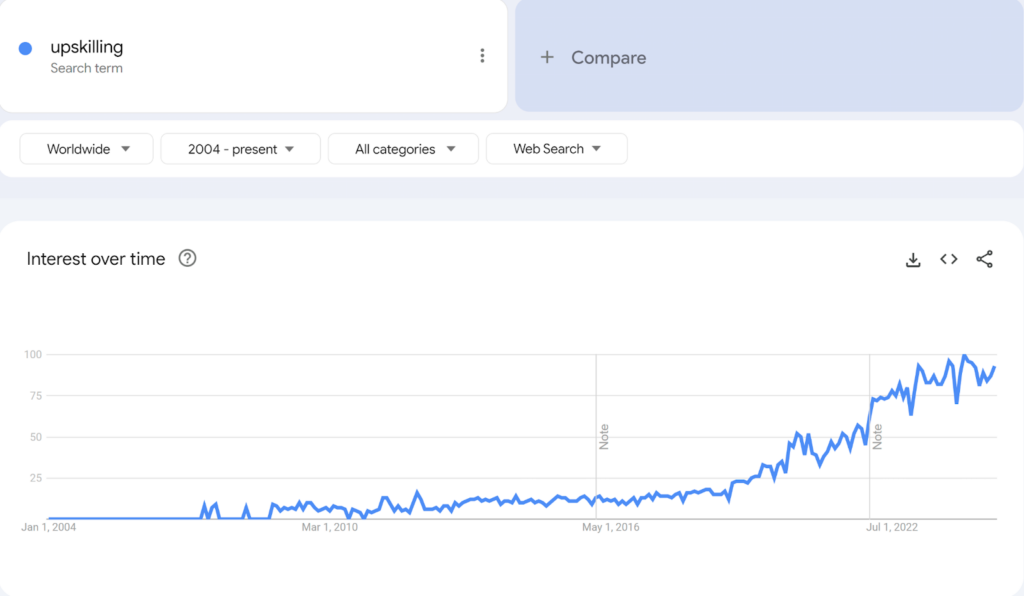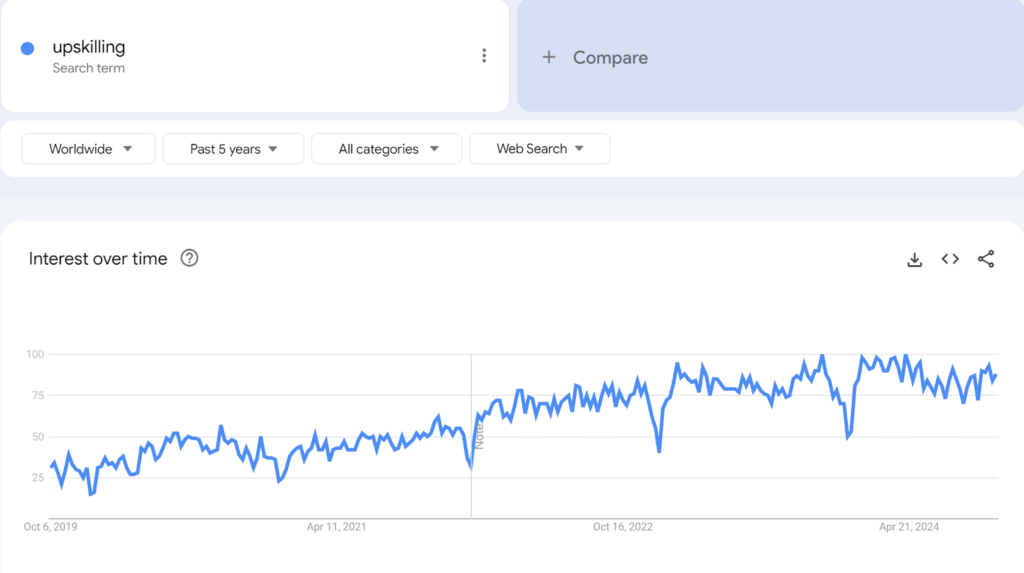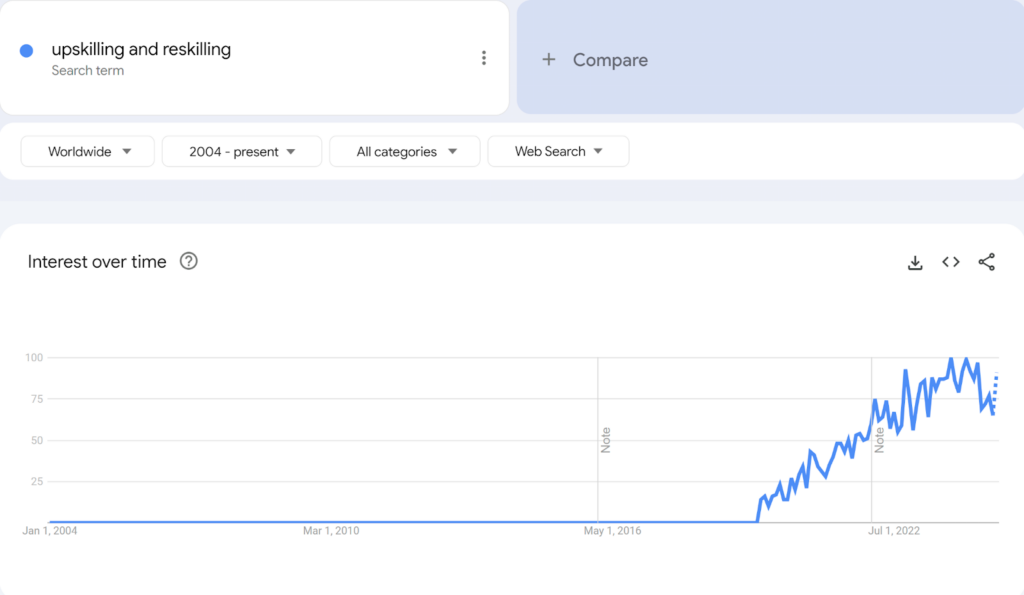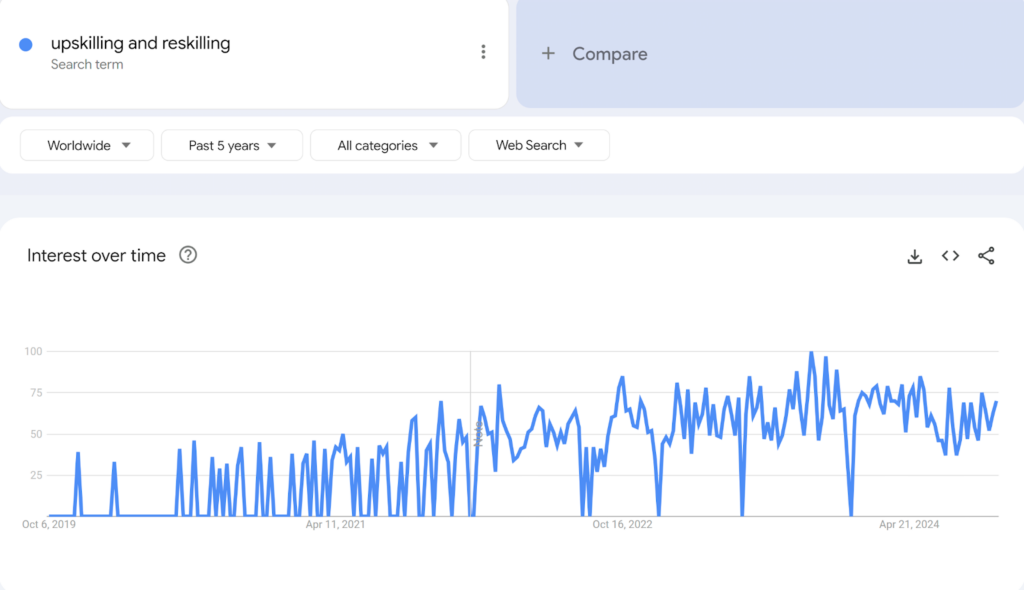Photo by Jeswin Thomas for Unsplash
If you’ve followed the OneRange blog for a while, you may have noticed that we’ve made a shift over the past few years from talking more broadly about professional development, continuous education, and lifelong learning, to leaning more directly into the terms upskilling and reskilling.
This has been a deliberate choice, and it may leave you wondering: what’s the difference between all these words, anyway? In this article we’ll dive into a discussion about the meaning of upskilling and reskilling. Then, we’ll demystify the concept of upskilling marketplaces and explain what all the hype is about.
What is upskilling, and what makes it different?
Terms like professional development, continuous education, lifelong learning and upskilling refer to similar things and can be used interchangeably in many contexts. Upskilling and reskilling, however, are newer terms that are more specific, whereas the others are more general and broad.
We did a quick analysis of some Google Trends data over the last decades to track the growth of upskilling and reskilling over time. If you’ve never played around with it before, Google Trends is a tool that allows you to see how the search volume of terms entered into the Google search engine have changed over time (since the early 2000s). It’s a pretty blunt instrument, but it gives you a good sense for the general trajectory of trends.
Let’s look at the term upskilling. In the charts below, you can see that the use of “upskilling” was almost non-existent prior to 2016, and really started to take off around 2019 (incidentally, this was around the same time that we launched OneRange!).
Around that same inflection point in 2019, you start to see the combined terms upskilling and reskilling enter into the internet lexicon.
Upskilling vs. reskilling: Both are about skills!
The base word “skill” in upskilling and reskilling gives you a clue about what makes these terms unique. They’re focused on acquiring specific skills and competencies, rather than just gaining general knowledge for the sake of learning and personal edification. They’re generally used in the context of talking about jobs and careers, versus other broader learning situations. Now let’s take a closer look at the difference between upskilling and reskilling.
According to Stanford, upskilling is “the practice of acquiring new skills or enhancing existing skills to stay competitive in the job market. Upskilling is specifically focused on obtaining knowledge, expertise, or capabilities related to your current field or industry in order to advance your career or adapt to changes in the job market” (emphasis added).
On the other hand, reskilling “refers to the acquisition of entirely new skills. Reskilling is often pursued to pivot to a different career or industry due to changes in job demand or personal career goals. It can also be initiated by an organization to shift an employee’s responsibilities to help meet their changing goals” (emphasis added).
Did you catch the distinction there? Whereas upskilling is more about gaining skills to maintain your current career trajectory, reskilling is about gaining skills to transition to a new job or industry.
What upskilling and reskilling mean to us at OneRange
For the team here at OneRange, we think about upskilling and reskilling as active endeavors. They are verbs (well, technically gerunds), versus the more passive noun phrases professional development and continuous education. We believe upskilling and reskilling should be targeted, individualized, continuous, and proactive. Whereas broad training and development may help you advance your career in a wider sense (which we love, too), upskilling and reskilling are focused activities that enable you to acquire the specific skills you need to succeed tomorrow and into the future.
Upskilling vs.compliance training and development: A parenting anecdote

We can take a closer look at the difference between upskilling, training and development with an anecdote from OneRange co-founder Steve Gilman. Steve and his wife recently had their first child. In anticipation of the baby’s arrival, they read some general parenting books (development). At the hospital, they gained some in-the-moment, “on-the-job” training on how to use a car seat and safely take their baby home for the first time (compliance training).
But, when their baby was having trouble sleeping through the night, they realized that their general parenting education would not be enough to carry the day (or, uh, night). Friends recommended some very helpful books on sleep hygiene that they read and implemented immediately, to great success (upskilling).
While this example technically wouldn’t fit the precise definition of upskilling because it relates to parenting, not jobs (although we contend that homemaking is a very important profession!), hopefully it helps to clarify some of the differences between the terms training, development, and upskilling – and the important role that each has to play.
What is an upskilling marketplace?
Now, let’s consider the concept of an upskilling marketplace. In eCommerce, a marketplace is a digital platform that serves as a hub connecting buyers and sellers of products or services. Think eBay, Craigslist, Airbnb, Poshmark, and Taskrabbit.
At OneRange, we don’t (currently) offer our own upskilling and reskilling content. Rather, we connect companies and employees to the best content from more than 1000 top learning providers through our upskilling marketplace.
What gives marketplaces their power is the fact that they are dynamic, open ecosystems offering choice, variety, flexibility, and a layer of vetting and curation. Marketplaces enable companies to benefit from a universe of upskilling options that supports empowered inclusion across global teams, rather than being restricted by the limits of their own internal LMS content.
OneRange is an upskilling marketplace on steroids
Beyond being just a marketplace, OneRange is unique in that it operates as an all-in-one platform. It combines the flexibility of a Learning Experience Platform (LXP), the control of a Learning Management System (LMS), and the functionality of a benefits manager (through approvals, budgeting and payment processing).
We also try to add a lot of value on top of the core connection functionality of the marketplace. We use AI-powered discovery to help each individual find exactly the right resources, tailored based on their job role, interests, and learning goals. We provide rich data and insights on learning behaviors and skill gaps that empowers employers and individuals to better track their upskilling journeys. We also help companies, managers, and individuals manage the administration of upskilling budgets in order to optimize the return on their investments (ROI) and make smarter decisions about skill development priorities and talent management strategies.
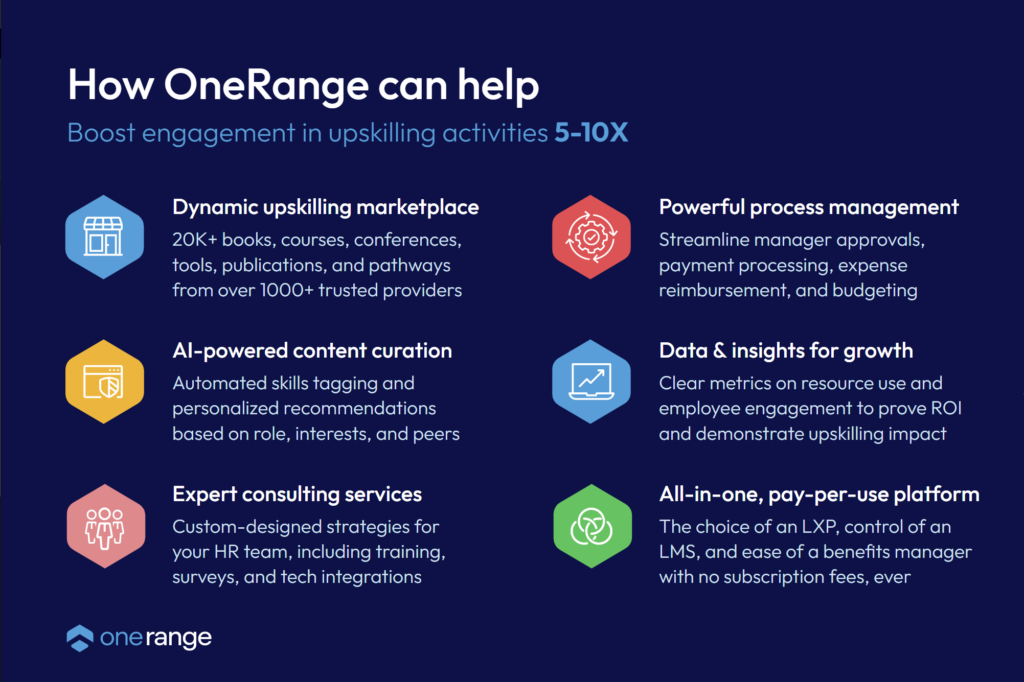
Our promise to you
At OneRange, we see our role as being a lot more than just a marketplace or technology provider. We’re experts committed to upskilling and reskilling, and self-proclaimed personal development nerds who are always learning, listening, and growing. Our mission is to work with you to develop a successful upskilling program you can be proud of.
In our next articles, we’ll talk more about some of the benefits of an upskilling marketplace, and why we believe it’s the future of training and development! Thanks for coming along with us on this journey!



